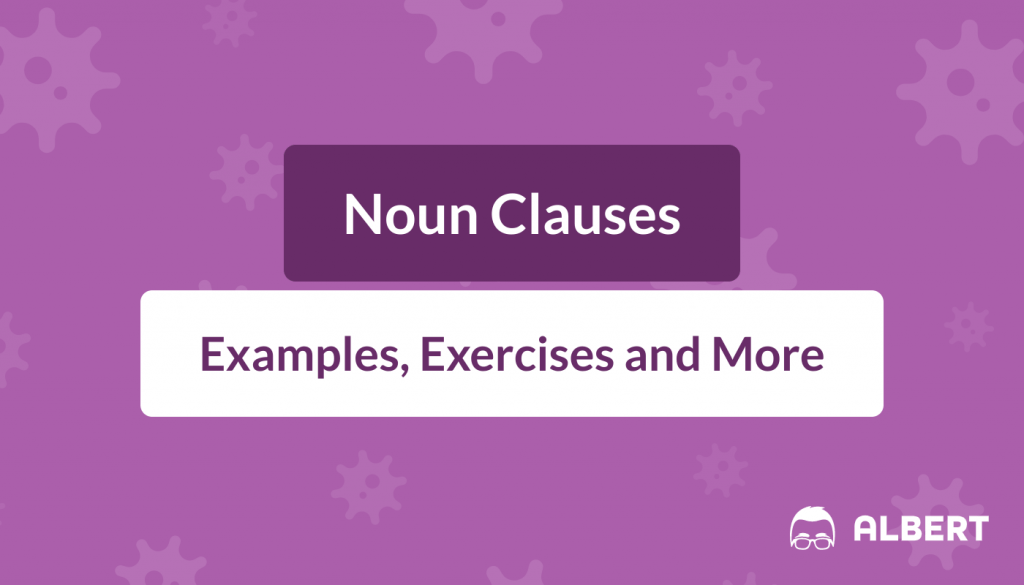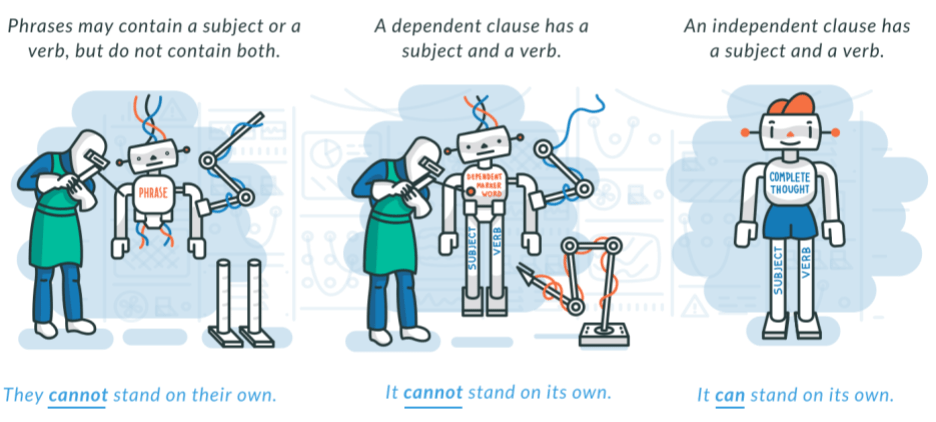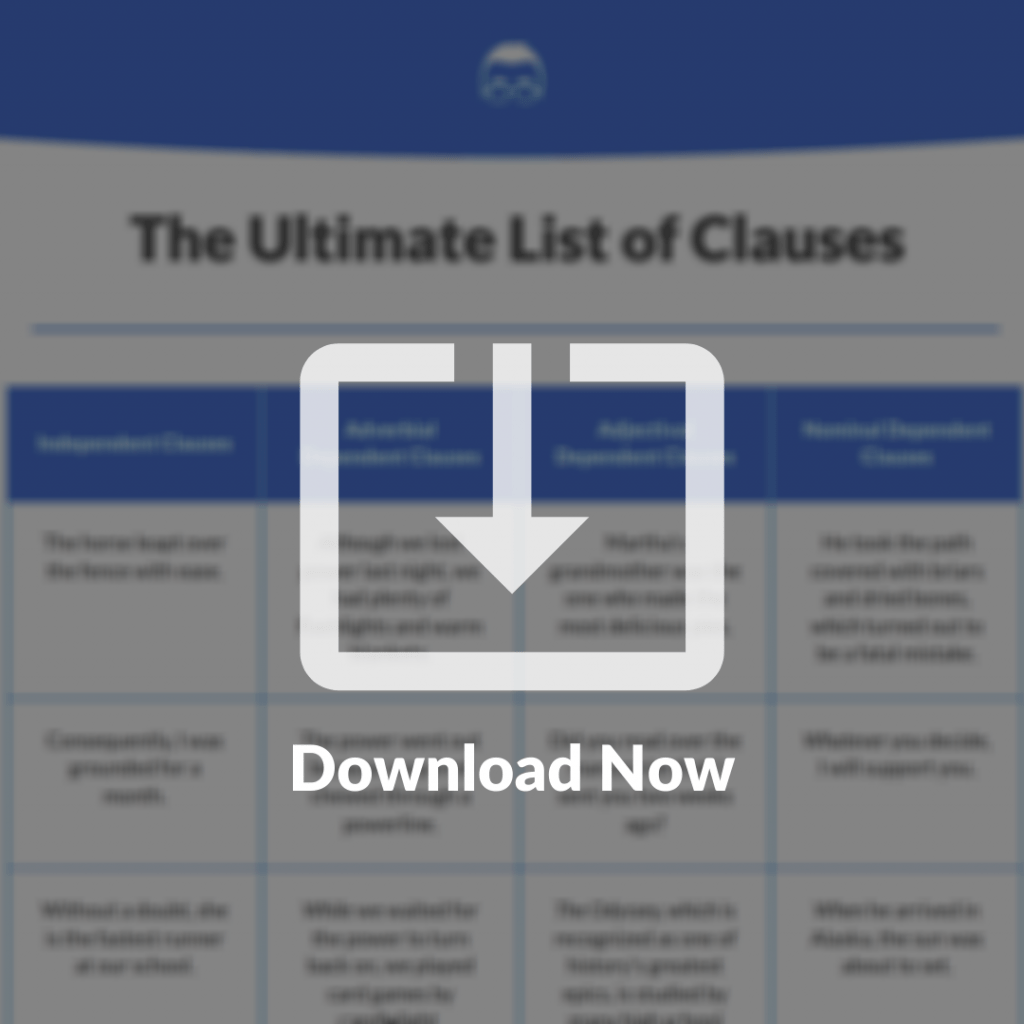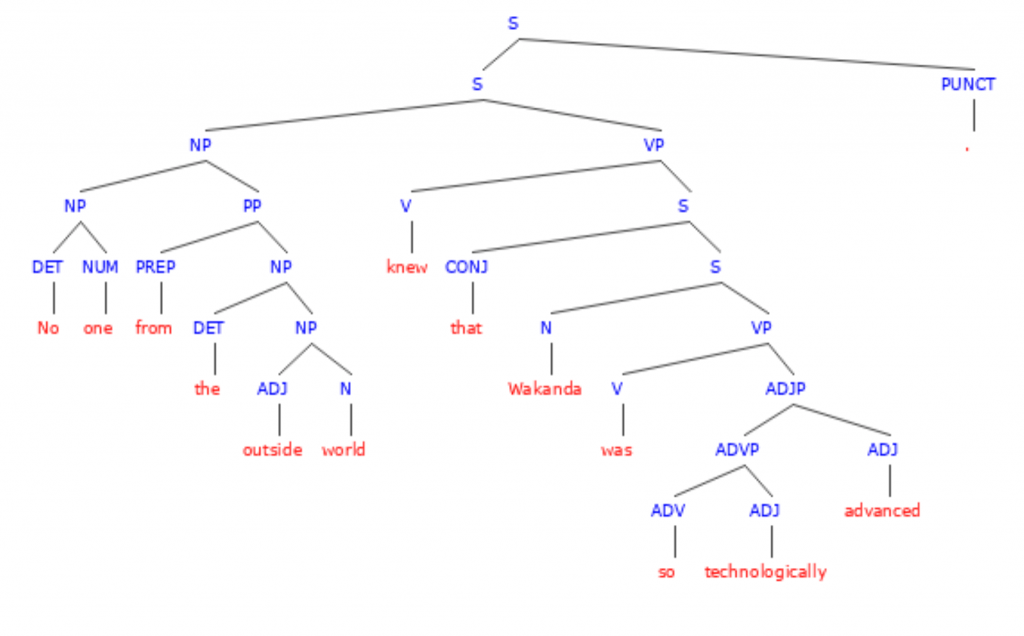- Get link
- X
- Other Apps
Noun Clauses: Definition, Examples, & Exercises
- The Albert Team
- Last Updated On:

Dependent clauses add meaning to independent clauses in a variety of ways by acting like adjectives, adverbs, or nouns.
Relative clauses are dependent clauses that modify or give more information about a noun in the independent clause.
For example:
- Scar, who was Simba’s jealous and wicked uncle, threatened to take over Pride Rock.
The dependent relative clause, who was Simba’s jealous and wicked uncle, modifies or gives more information about the noun subject of the independent clause, Scar.
Additionally, adverbial clauses are dependent clauses that modify or give more information about a verb in the independent clause.
For example:
- When Timon and Pumba first meet Simba, they are afraid that Simba might eat them.
The dependent adverbial clause, when Timon and Pumba first meet Simba, explains when they are afraid, modifying the verb in the independent clause.
Lastly, noun clauses are dependent clauses that can replace any noun in the sentence.
For example:
- Rafiki encouraged Simba to remember who he was.
In this sentence, the noun clause, who he was, is acting as an object of the infinitive phrase to remember.
For this post, we will focus on noun clauses, but you can learn more about adverbial and relative clauses on the Albert blog.
When you’re ready, test yourself with a quiz and practice with our high-quality, standards-aligned questions here.
The Basics of Noun Clauses

What is a Noun Clause?
A noun clause is a dependent clause that takes the place of any noun in the sentence, whether they are subjects, objects, or subject complements.
For example:
- She was saddened by what she had read.
In the sentence above, the noun clause what she had read is being used as the object of the preposition by.
This is only one example, as there are many different ways that noun clauses can be used. Review the next section to learn every possible way that a noun clause can function in a sentence.
What are the five functions of noun clauses?
1. Subject
Noun clauses can function as subjects of sentences.
For example:
- Why my pet turtle stares at me all day is beyond me.
In the sentence above, the underlined noun clause acts as a single subject of the independent clause.
2. Direct Object
Noun clauses can also function as direct objects of the verb in the independent clause.
For example:
- When my dog goes to doggy day care, I do not know what he does, but he always has the best time.
In the sentence above, the noun clause what he does is acting as the direct object of the verb know.

3. Indirect Object
Noun clauses can also act as indirect objects of the verb in the independent clause.
For example:
- She chose to photograph whomever was willing to pose for her.
In the sentence above, the direct object of the verb chose is the infinitive phrase to photograph. Just like a noun clause, this infinitive phrase is acting like the noun direct object. Therefore, the noun clause whomever was willing to pose for her is the indirect object of the same verb.
4. Object of the Preposition
Other times, noun clauses can act as the object of a preposition in the independent clause.
For example:
- I like to keep a schedule of when I have upcoming appointments.
In the sentence above, the noun clause when I have upcoming appointments is acting as the object of the preposition of.
5. Subject Complement
Lastly, noun clauses can actas subject complements, or nouns that follow linking verbs.
For example:
- Actors can become whomever they want to be on the stage.
In the sentence above, the noun clause whomever they want to be is the subject complement of t
3 Tips for Understanding Noun Clauses
Here are some important tips to help you understand Noun Clauses:

Tip #1. Noun Clauses can replace any noun in a sentence, including subjects, objects, and complements
For example:
- No one knows why she is afraid of lizards.
In the sentence above, the noun clause replaces the direct object of the verb, knows.
Tip #2. Noun clauses are not modifiers; they are placeholders
For example:
- Noun Clause (acting as a subject): When she will arrive is dependent on traffic.
- Adverbial Clause (acting as an adverb): When she arrives, we will eat dinner.
As you can see, it is easy to confuse these different types of dependent clauses with one another. If you are unsure whether a clause is adverbial or nominal (noun), simply ask some questions:
- If the clause answers the question, “who?” or “what?”, then it is a noun clause.
- If the clause answers one of these questions: “where?”, “how?”, “when?”, or “why?”, then it is an adverbial clause.

This is the key distinction between noun clauses and relative or adverbial clauses. While relative clauses and adverbial clauses modify nouns and verbs respectively, noun clauses replace nouns altogether.
Tip #3. Noun clauses always begin with either interrogative pronouns or expletives
For example:
- The pug did not know what would make his life any more perfect.
The underlined clause in the sentence above begins with the interrogative pronoun, what, making it a true noun clause that is acting as the direct object of the verb, know.
Noun clauses can also begin with expletives (no, not cuss words!). In grammar, expletives are words that have no grammatical function in a sentence other than to signal the start of a noun clause. Common expletives are that, whether, and if.
- As his humans drank their coffee, the pug wondered if they would all hike to the waterfall today.
Even though the expletive if is necessary in understanding the noun clause, it still has no grammatical purpose in the sentence other than to connect the noun clause to the verb wondered.
Return to the Table of Contents
Applying the Basics: Noun Clause Review & Practice
Now that you understand how noun clauses function in sentences, review the anchor chart below and complete the review to fully understand how to use and recognize noun clauses.
The Ultimate List of Clauses
Refer to the graphic below to learn the different types of Clauses:
This list, obviously, does not include all possible examples of clauses; however, it is meant to be used as a guide while identifying sentence clauses.
Noun Clauses Exercises and Review
Now that you know how to identify noun clauses, test your ability to find these in sentences.
Select the noun clause(s) in the sentences below. Remember, a noun clause can replace any noun in a sentence, but these clauses must answer the questions “who?” or “what?”, and they must start with either an interrogative pronoun or an expletive.
1. No one from the outside world knew that Wakanda was so technologically advanced.
In this sentence, that Wakanda was so technologically advanced is a noun clause taking the place of the direct object of the verb, knew.
2. Kilmonger demanded to know why T’Challa refused to protect threatened people of African descent.
In this sentence, the noun clause why T’Challa refused to protect threatened people of African descent is acting as the indirect object of the verb, demanded.
3. M’Baku decides to help T’Challa in repayment for when T’Challa chose not to take his life.
In this sentence, when T’Challa chose not to take his life is a noun clause acting as the object of the preposition, for.
4. When they meet on the battlefield, W’Kabi must decide whether to join his wife, Okoye, or to continue to fight against T’Challa.
In this sentence, whether to join his wife, Okoye, or to continue to fight against T’Challa is a noun clause acting as the direct object of the verb, decide.
5. Whoever ingests the heart-shaped herb receives the superhuman power of vibranium.
In this sentence, whoever ingests the heart-shaped herb is a noun clause acting as the subject of the sentence.
Pro tip: Remember, noun clauses can replace any noun in a sentence, and can function as subjects, objects, or subject compliments.
For additional practice, check out Noun Clauses content on Albert.
Return to the Table of Contents
Try for Yourself: Noun Clauses Quiz

Feeling confident in your understanding of Noun Clauses?
Take this short six-question quiz to see what you’ve learned:
1. Can a noun clause be used as a modifier?
- Answer: No
- Correct Explanation: That’s right! Noun clauses do not act as modifiers; rather, they replace nouns in sentences from subjects to objects to subject complements.
- Incorrect Explanation: Sorry, that’s not right! Remember, noun clauses do not act as modifiers; rather, they replace nouns in sentences from subjects to objects to subject complements. Only adverbial and relative clauses can act as modifiers.
2. Are noun clauses considered dependent or independent clauses?
- Answer: Dependent clauses
- Correct Explanation: That’s right! Noun clauses are always dependent because they depend on the independent clause to create a complete thought.
- Incorrect Explanation: Sorry, that’s not right! Remember, independent clauses contain a subject and a verb and create a complete thought, while dependent clauses cannot express a complete thought without the help of an adjoining independent clause.
3. In this sentence, is the underlined clause a noun clause or an adverbial clause?
When we go to Universal Studios, I want to visit Diagon Alley.
- Answer: Adverbial Clause
- Correct Explanation: That’s right! The underlined clause is an adverbial clause because it answers when the verb takes place.
- Incorrect Explanation: Sorry, that’s not right! Remember, adverbial clauses modify verbs while noun clauses can replace any noun in a sentence.
4. In this sentence, is the underlined clause a noun clause or an adverbial clause?
How Disney World’s creators made it so magical is something that I still wonder about.
- Answer: Noun Clause
- Correct Explanation: That’s right! The underlined clause is a noun clause that is acting as the subject of the sentence.
- Incorrect Explanation: Sorry, that’s not right! Remember, adverbial clauses modify verbs while noun clauses can replace any noun in a sentence.
5. In this sentence, is the underlined clause a noun clause or a relative clause?
I am nervous that a lion escaped from the zoo last night.
- Answer: Noun Clause
- Correct Explanation: That’s right! The underlined clause is a noun clause that begins with an expletive and acts as the subject complement of the linking verb, am.
- Incorrect Explanation: Sorry, that’s not right! Remember, relative clauses modify nouns while noun clauses can replace any noun in a sentence.
6. In this sentence, is the underlined clause a noun clause or a relative clause?
The zookeeper who rescued the lion found him taking a nap in the park.
- Answer: Relative Clause
- Correct Explanation: That’s right! The underlined clause is a relative clause because it modifies the noun, zookeeper.
- Incorrect Explanation: Sorry, that’s not right! Remember, relative clauses modify nouns while noun clauses can replace any noun in a sentence.
For additional practice with Noun Clauses, check out our practice on Albert: Noun Clauses.
Return to the Table of Contents
Teacher’s Corner for Noun Clauses
When students think of nouns and the roles that they play in sentences, they usually think of a singular word acting as the subject or a direct object. As grammar teachers know, it is not this simple!
Noun clauses allow entire phrases to be considered as objects or subjects in sentences, which is great for expanding our voice as writers, but not so great when it comes to understanding the syntax of more complicated sentences. The Common Core English Language Progressive Skills Chart is a helpful resource for teachers wishing to scaffold their students to help them understand first, the function of nouns in sentences, and secondly, how noun clauses also fit into these many functions.
For specific standards on the different types of clauses including noun clauses, check out the Common Core State Standards website.
Albert’s Noun Clause Practice is a helpful tool in allowing students to practice identifying and using noun clauses in a variety of sentences. Whether you would like your students to complete pre-assessments, post-assessments, quizzes, or all of the above, Albert’s question bank and grammar assessments and quizzes can be used by educators for many different purposes in the classroom.
Return to the Table of Contents
Summary for Dependent Clauses
Noun clauses are dependent clauses that can replace any noun in the sentence: subjects, objects, and/or subject complements.
In all, there are five different functions that a noun clause can serve: subjects, direct objects, indirect objects, objects of the preposition, and subject complements


Comments
Post a Comment